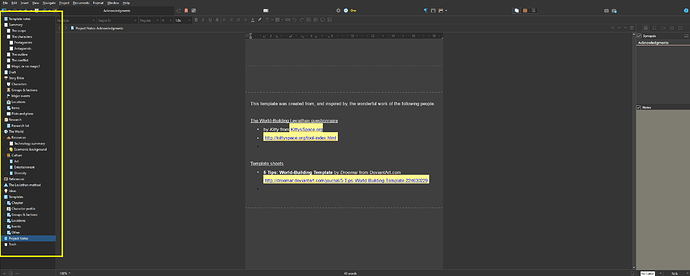Introduction
So, for the longest time, I have been using Scrivener for almost everything, and as much as I love the software, There are still features that are missing from it’s criteria that make it the best overall novel writing software. There are two key features that keep me from completely using Scrivener for all my writing needs. Those two features are as followed: Character Development Tools, and World Building Tools.
As a Fantasy Writer, I feel that it would be necessary to have these tools implemented into Scrivener and would be a great time saver for many other writers as well. Yes, Scrivener does give you the option to develop your own tree structures, but to me, it feels like it’s a tad bit out of date, and would like something to increase my productivity within Scrivener, rather than having to rely on something like Campfire, or World Anvil for my World Building and Character Development needs. Hell, I don’t really care if you make completely new programs (I know it’s unrealistic, but would be highly appreciate (Yes, I would buy them in a heartbeat)) that can fill this void.
Character Development Tool Features
-
Character Profile in the style of a “social media” programs with the following tabs: Basic Stats, Relationships, Sexuality, Skills, Personality & Character.
-
Ability to add photo for said profile.
-
Basic Stats Tab Features: Name, Sex, Age, Race, Height, Body Type, Hair Color, Eye Color, Complexion,
-
Relationship Tab Features: Family (subtab): Brothers, sisters, mother, father (Possibly giving us the ability to link between these other character profiles as well), Friends (subtab): Best Friends, Friends, Associates, etc
-
Sexuality Tab Features: Sexual Orientation, Sexual Experience, Romantic Experience
-
Skills Tab Features: Skills List (Possible have another section in the World Building where we can link certain skills for further explanation), Occupation and Schools, Hobbies, etc.
-
Personality and Character Features Tab: Maybe some check Boxes, or pop us menus to help us build our characters faster? Introverted or extroverted? Right or Left Brained, Political Standing, Strengths, Weaknesses, Goals/Dreams/Aspirations, Fears, Insecurities, What Would They Die For?, etc.
World Building Tool Features
- Worlds: The Ability to design worlds
- Maps: It would be super useful to be able to upload an image of a map that we designed and then place “pin-points” on the image, and then link those to location articles that we previously wrote.
- Religion Development Tools: Spirituality is a huge part of culture and in fantasy, if would be nice to have this, but not necessary.
- Magic Development System: A simple, fill-in-the-blank styled to help us organize spells, hard and soft magic skills, etc.
- Cities, and City State profiles
- Fake Language Development Tools
- Family Tree Development
- Race and Species
Other Features That Would Be Nice
- Notes Tab: For taking notes that won’t appear in the profiles, or “articles”.
- Better Outlining, or “Story-board” feature.
- The ability to assign characters, locations, and items to specific “scenes”.
In Conclusion
I know that it’s a little too much to ask for, but I’m sure than along side with me, and many others, this would greatly increase the value of this program. Sure, it might make the price go up a little bit, but if it means that we’re receiving more in-depth tools to make use faster, more organized writers, then I say that is perfectly justifiable, or if the devs want to develop these tools, then ask them if they could implement some way to create our own plugins with a “Scrivener” scripting language, or just plain-old Python or Java, so we can create these plugins to make our writing experiences better and more efficient.
I’m aware that this is a long post, and I really appreciate you reading this far. What do you all think about these features? Are they a little too much to ask for? I’m not saying that they should be implemented immediately in the next update, but over the course of updates here and there. In conclusion, I really love this program. It’s gotten me to write so many of my novels, and I would love to see it grow into a even better writing suite!
- R. R. Solomon, Writer, and Editor of Unwoke Literature
 ).
).


 My note on “API or Hooks” was written in August of 2015. Now almost 6 years later, here’s an update.
My note on “API or Hooks” was written in August of 2015. Now almost 6 years later, here’s an update. , like a homeowner who elects to renovate their home, when they needed a general contractor and full permits.
, like a homeowner who elects to renovate their home, when they needed a general contractor and full permits.


 )
)